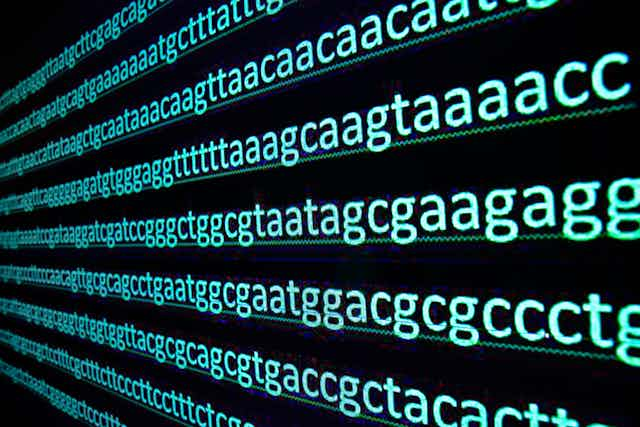Under a new proposal, people in England will be able to pay the NHS to have their genome sequenced, as long as they agree to share their anonymised data with researchers. This scheme would work in parallel with NHS-funded genome sequencing offered to people with certain inherited conditions and follows the 100,000 Genomes Project, which set out to learn more about how changes in DNA contribute to rare diseases and cancer.
Collecting genome sequence data from healthy people will undoubtedly increase our understanding of the link between DNA and disease and lead to new treatments. However, NHS delivery of a service that lets the public pay for personalised reports on their genetic make-up is premature.
The human genome is incredibly complex and our understanding of its role in disease is very limited. We all have a vast number of genetic variants, and it can be hard to know which ones might have contributed to disease. Identifying clear genetic causes for most patients’ health disorders in the 100,000 Genomes Project is proving difficult. Now closed to recruitment, the 100,000 Genomes Project is far from complete. While some patients have received a result that explains their disorder or suggests treatment, most have not. The challenges that contribute to the low success rate are under-appreciated by patients, the public and healthcare professionals.
Some serious inherited conditions can be detected early and there are treatments that can reduce the risk of them developing or causing problems. These include familial breast, ovarian and bowel cancer, inherited heart conditions such as hypertrophic cardiomyopathy, connective tissue disorders such as Marfan syndrome, and familial high cholesterol.

Healthy blood relatives of a person affected by one of the aforementioned inherited disorders can already access screening on the NHS and, if necessary, take precautions to limit their risk of developing the disease. Depending on the disorder, precautions range from taking medication, such as statins, to having surgery, such as mastectomy.
To understand the risk of inherited disease in a healthy person who has no family history of that disease, scientists could look in that person’s genome for gene variants that have been shown to cause disease in patients. Research has shown that most people would want to know if they have gene variants that put them at risk of a serious, treatable disease. Genomic information is not just personal – immediate blood relatives of a person found to carry a disease-causing gene variant will have a 50% chance of inheriting the same variant.
About 2-3% of healthy people carry a variant linked to one of the serious but treatable disorders mentioned above. The problem is that almost all the data linking gene variants with disease risk come from people who have the disease. So we don’t know how big or small the risks are for healthy people found to carry a gene variant for a particular disease if the person has no family history of that disease.
Even in families where someone has an inherited disorder, not all relatives carrying the same genetic variant will develop the disorder. It is also important to realise that if a healthy person’s genome contains no clear genetic risk variants, this can’t rule out the possibility that they will develop disease, including inherited disorders, because the causes are still not fully understood.
Too many unanswered questions
There are many unanswered questions about offering health risk information to healthy people based on genome sequencing. For example, which gene variants should be thought of as being linked to disease risk? Should healthy people receive genetic counselling? If so, when? What medical tests might be useful to detect disease, how often and for how long should those tests be repeated? Should healthy carriers think about taking protective drugs or preventative surgery to manage their risk even if we can’t be sure there is a risk or how big the risk is?
Then there is the question of what doctors should advise people to do if they have a risk variant – and whether patients will act on that advice. And what effect will learning about a possible disease risk have on people’s mental health? Will people tell their relatives about the risk to other family members, and should the NHS also offer to test their relatives? Finally, there is the question of what this will all cost the NHS – is it justified?
While the cost of the test may be borne by the customer (although we don’t know the price tag yet), the price won’t include costs of data interpretation, counselling and tests to look for a disease over a lifetime in healthy people who may never develop disease.
Selling genome sequencing and using it to provide health risk information conflicts with one of the NHS’s founding principles which is that access to care is based on clinical need, not ability to pay. We need carefully designed and evaluated research studies to decide whether genome sequencing benefits healthy people and the NHS – if it does it should be available to all citizens free of charge.

